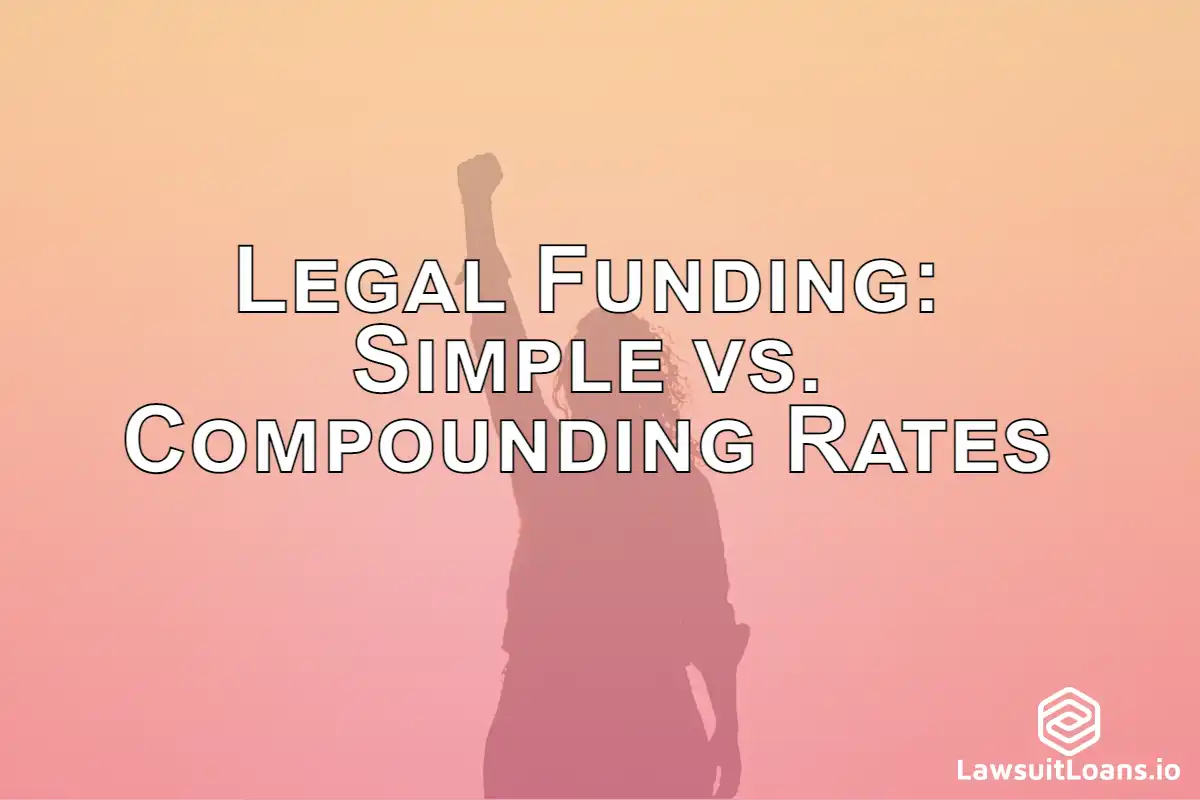Legal Funding: Simple vs. Compounding Rates
What is the difference between simple and compound rates? Basically, simple interest is interest calculated from the principal balance of a loan. Compound interest includes not just principal, but also any accrued interest to-date. Read more below.




Legal Funding: Simple vs. Compounding Rates
When you are in need of money while waiting for a personal injury or other type of pending lawsuit to settle, pre-settlement funding offers a simple way to quickly get a cash advance against the anticipated settlement. The interest rates charged for the cash advance is set by the legal funding company, so you need to compare the rates and terms of several companies to find one to apply to for a lawsuit loan.
A key factor to consider when comparing companies is not only the rate of interest each one charges. You also need to know whether they charge simple interest or compound interest. As you continue to read through this article, you’ll discover how differences in how legal funding companies compute the interest they charge can dramatically affect your cost when the time comes for repayment of the lawsuit loan.
Included among the key points covered in this article are the following:
- How does lawsuit funding work?
- What is simple interest?
- What is compound interest?
- How does the choice of compound versus simple or non-compounded interest affect the cost of your lawsuit funding?
- How to choose the type of annual interest rate that is best for you?
How does lawsuit funding work?
When you need money to pay bills, buy or repair a car, or for another reason, waiting for a lawsuit to be settled may not be an option. Lawsuit funding gives you access to a future settlement right now through a lender who agrees to advance part of the value of your pending claim in exchange for you agreeing to allow the lender to recover the cash advance plus interest when the case finally settles.
Lawsuit funding is nothing like traditional loans that you may have gotten from a bank or credit union. Traditional loans are recourse transactions, which means the lender looks to you for repayment of the debt. If you fail to make the monthly payments on the loan, the lender may seize your assets and income to recover the balance due on the debt.
A lawsuit loan is a non-recourse transaction because the lender does not have a right to look to you for repayment of the debt. Instead, the lender receives payment only from the settlement of your lawsuit. If the case does not end with a favorable settlement, the lender has no recourse against you.
This is why when you apply for legal funding the application process does not include verification of your income and assets or a credit check to see your credit score and past history of repaying your debts. Legal funding companies focus their underwriting process on determining the likelihood of a settlement of the claim in your favor and the estimated value of the settlement.
Legal funding companies make money by charging interest on the cash advance. Some companies charge compound interest rates while other companies charge simple interest. The difference in the two methods of computing the amount of interest to charge can significantly affect the amount of money that must be repaid from the settlement when a case drags on for longer than anticipated.
Get up to $500,000 With Rates as Low as 2.5% Simple, Monthly
Simple Interest
Interest rate charged for borrowing money is expressed as a percentage, which should be familiar to you if you have ever shopped or applied for a traditional loan. If a lender advertises an interest rate of 10% without identifying it as simple or compounded interest, then you are only getting part of the information that you need to know what the loan will cost.
Simple interest is computed based on the principal amount of the money lent to you and the time between when you receive your cash advance and when it’s repaid. Simple interest expressed as a formula would be: rate of interest x principal amount x time.
If you borrow $5,000 at 3% monthly simple interest for five months, you would repay $5,750 at the end of five months, which is the $5,000 principal borrowed plus $750 in interest. The 3% interest amounts to $150 each month, so if your lawsuit settles in 10 months instead of in five, the total amount deducted from your settlement money would be $1,500 in interest plus the $5,000 principal. As you can see, the longer it takes to settle a case, the more it costs to repay the loan.
The benefit of simple interest is that you do not pay interest on the monthly interest accruing on the loan. Although simple interest ends up costing less than a loan with compound interest, it still may appear to be more expensive than a loan taken from a traditional lender.
Lawsuit loans cost more than traditional loans because of the risk taken by the funding company. The non-recourse nature of legal funding and the fact that the only source for repayment available to a lender is a settlement that may or may not be in your favor increases the risk of loss that lenders offset by charging higher rates of interest than traditional lenders.
One of the reasons to discuss with your lawyer the decision to obtain funds through legal funding is to get an idea of how long it may take to settle your case. Using the estimated settlement time you get from your lawyer will help you determine what the lawsuit loan may end up costing.
Compounding Interest
When a lender quotes an interest rate of 3%, you need to know if it is compounded and what compounding periods the lender uses to compute the cost of the loan. The way compounding works is that interest is computed on the principal and on the accumulated interest.
For example, if you receive a cash advance of $5,000 at 3% compounded monthly, then at the end of one month, you owe: $5,000 principal balance + $150 interest = $5,150. It may look identical to simple interest, but that’s only if your case is settled and the funding company is repaid. If it is not, then in the second month you owe: $5,150 principal and accumulated interest + $154.50 interest = $5,304.50.
Legal funding companies that use compound interest do not all use the same period for compounding interest. For instance, a company using daily or monthly compounding interest will cost more over time than a company that uses quarterly or yearly compounding. Take that into account when making financial decisions about lawsuit funding and the company to choose.
Get Started
Apply today and get funds in as little as 24 hours!
Comparison of Simple, Non-Compounding Interest and Compounding Interest
The effect of using a compound interest formula results in the cost of a lawsuit loan being greater than it would have been with a funding company that uses simple, non-compounding interest. If the $5,000 is repaid in five months at 3% monthly simple interest, the total would be $5,750. The same loan with monthly compounding would be $5,796, which may not be that much of a difference, but the difference becomes more pronounced the longer it takes to achieve a lawsuit settlement to repay the lawsuit funding company the money that is owed to it.
As a general rule, a cash advance through a pre-settlement funding company that uses compounding interest rates will be greater than lawsuit loan companies that use non-compounding interest. One way to possibly close the gap between loans with non-compounding interest and those with compounded interest rates is to look at the compounding period.
Some lenders use monthly compounding, which means you are charged interest on interest each month. You may save money by using a lender with compounding interest at quarterly or longer periods.
How To Determine Which Type of Rate To Choose
When you desperately need money, it can be difficult to make sound financial decisions.
If comparing between simple and compound interest at the same quoted rate, with everything else equal, simple interest will always be the cheaper option.
However, in the real world, you could be comparing two different rates, contracts with different fees, etc. That can make it hard to have an apples to apples comparison.
Our recommendation? Ask every lawsuit loan funding company that you apply with for a quote in the form of a payoff table. A payoff table shows in real dollar terms how much the advance will cost over time.
Always consult with an attorney at the law firm handling your lawsuit about your current financial needs and other options that may be available to you in addition to pre-settlement funding. For example, borrowing from a bank, a cash advance on your credit card, or borrowing from a relative may be less costly than a lawsuit loan.
When considering all of the options available to you, take into account the following factors:
- Evaluate the Urgency of your Financial Need: Traditional loans take time, but a pre-settlement loan can put money into your bank account within 24 hours from when you submit an application.
- Consider the Total Cost of Funding: Compare lenders and the interest rates they charge to find the legal funding company with the lowest rates and best repayment terms.
- Assess Your Ability To Repay the Funding: This is where the law firm representing you can be extremely helpful in estimating how long it may take for a settlement in your lawsuit to be reached. The cost of the cash advance increases the longer it takes to repay it.
- Consult with a Financial Advisor: A financial advisor or your attorney can be valuable resources for advice and guidance in making a decision about staying financially afloat while awaiting a lawsuit settlement.
Financial decisions are never easy to make, so do not rush into making one without considering all of your available options.
Get $500 – $500,000 in as Little as a Single Business Day!
We understand that if you’re applying for funding with us, you needed the funding yesterday. With your attorney’s cooperation, we can provide funding as soon as the same business day.
Conclusion
Comparing interest rates charged by legal funding companies is essential for reducing the cost of borrowing against a pending lawsuit settlement. Ask questions about the rates charged and whether interest is compounded and the compounding period used by the lender. Only after comparing companies and their rates should you make a choice of a lender.